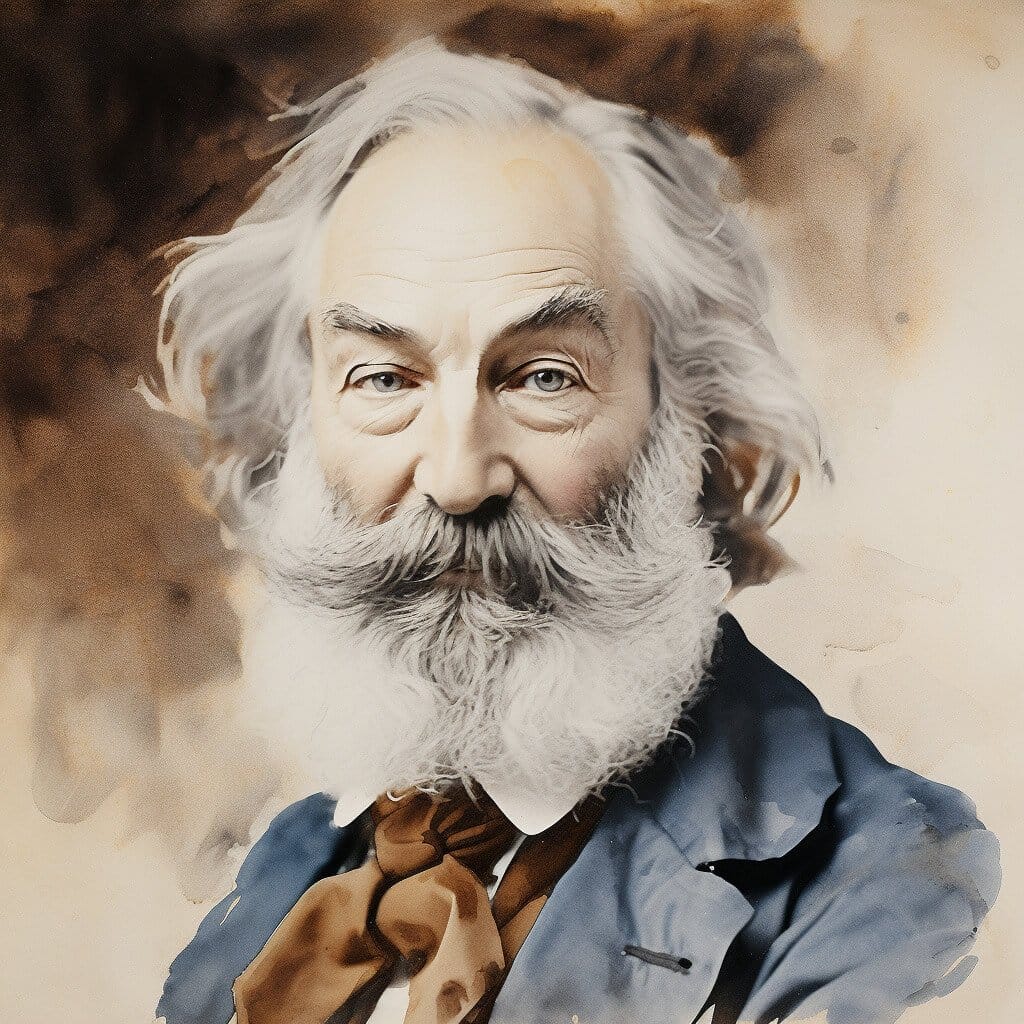Walt Whitman, born in 1819, is known as the father of free verse poetry. His deeply emotional, spiritual, and nature-based poems appeal to poetry loves around the world. Throughout his work, he explores themes of life, the self, sexuality, nature, and spirituality.
He is widely regarded as one of the greatest and most influential poets to come out of America in the 19th century. He is seen on the same level as the likes of Emily Dickinson. One of the features of Walt Whitman’s legacy is the impact he had on later poets. He was seen as the successor to some of the all-time great poets, such as William Shakespeare, Homer, Virgil, and Dante.
Life Facts
- He was born in Long Island, New York, and was one of nine children.
- Whitman’s best-known work is the collection of personal poems, ‘Leaves of Grass.‘
- He was part of the American Renaissance movement.
- Whitman worked as a missionary in a hospital during the Civil War.
- Whitman died on March 26, 1892.
Interesting Facts
- Before his death, Whitman designed his granite mausoleum (it’s shaped like a house).
- ‘Leaves of Grass,’ published in 1855, was only 12 poems long.
- Whitman got his first job at 11 years old.
- He and Oscar Wilde briefly met and might have kissed.
- Bram Stoker (the author of Dracula) was a huge fan of Whitman’s writing.
Famous Poems
- ‘O Captain! My Captain! is an elegy devoted to a deceased “Captain.” This unnamed man was a great leader and someone the speaker knows the world will miss. At the beginning of the poem, the captain-less ship sails home to port and is greeted by a celebrating crowd. The speaker expresses his desire that the captain was there to see and feel the excitement of the people onshore. It is a well-known fact that this poem was written soon after Abraham Lincoln’s death, making Lincoln the beloved and deceased captain.
- ‘Song of Myself’ is one of the most popular poems in Whitman’s volume ‘Leaves of Grass;’ it is also the longest. It is an incredibly complicated poem and impossible to sum up in just a few lines. At its simplest, though, the poem is a celebration of life. It is a “song” about the speaker’s transcendent self. It is about becoming one with nature, understanding and accepting the truths of oneself, and meditating on what those truths mean.
- ‘Me Imperturbe‘ is about a speaker’s dedication to maintaining his current mental and emotional state of being in the face of the challenges the world throws at him. As is common within his poetry, it is through nature that Whitman’s speaker finds himself. The natural world allows him to shake off some of the clutter of his everyday life and free his mind. The experience also opens his mind enough so that he realizes that nothing he does, in the way of jobs or careers, would put his true self at risk.
- ‘Pioneers! O Pioneers!’ This piece was published in ‘Leaves of Grass’ in 1865 and is considered to be a tribute to the pioneers of the American West. The poet spends a great deal of time in the poem speaking about how courageous these men and women were and the perseverance it took to survive. An interesting element of this piece is the fact that Whitman chose to refer to the pioneers as “we.” He includes himself, and the reader, in the text. This creates a sense of unity that runs throughout the poem and connects everyone together as pioneers in one way or another.
- ‘I Sing the Body Electric‘ compares the body and the soul. Whitman comes to the conclusion that they are much more similar than they are different. He moves through different images of various kinds of bodies. There is a dense and thrilling list of images in the second part of the poem that outlines why the body is a beautiful thing. He speaks on both male and female bodies as well. The poem gets more specific towards the end when Whitman talks about one man, a farmer, who has five sons. He also places himself in the body of a slave auctioneer, whose job it is to sell black bodies. All parts of these bodies he speaks on are parts of the soul.
Explore more Walt Whitman poems.
Early Life
Whitman was born in 1819 and lived with his parents and eight other siblings in West Hills, Long Island, New York City. The Whitman Family moved to Brooklyn in 1823. By the time Whitman was twelve, he had started to become interested in the written word as he learned the printer’s trade. He would work in this trade until he became a teacher at the age of seventeen in 1836. His teaching career would continue until 1841 when he turned to journalism.
Literary Career
In 1855 Walt Whitman published the first edition of ‘Leaves of Grass’ with his own money. This initial iteration contained 12 untitled poems. This was far from the last version of the volume. It expanded from 12 poems out into the long and winding volume that we know today. This volume was the first major literary accomplishment of Whitman’s career. The collection was a turning point in American literature, as its free verse, unconventional themes, and celebration of the human experience were unlike anything that had been seen before. It is said that Whitman disregarded some of the poetic rules and patterns of his contemporaries.
He spent the previous years working as a journalist, writing columns, and a serialized novel lengthily titled Life and Adventures of Jack Engle: An Auto-Biography: A Story of New York at the Present Time in which the Reader Will Find Some Familiar Characters in six installments of New York’s The Sunday Dispatch.
Famously, ‘Leaves of Grass’ was met with suspicion and scandal. Sexuality played a major part in the volume (increasingly so as it grew). His publisher contemplated not releasing the second edition but ended up doing so. It contained 20 new poems and was continually revised and rereleased throughout Whitman’s lifetime. Whitman was inspired to write the poem by his travels through the American frontier and his respect for Ralph Waldo Emerson.
After spending time working in hospitals as a clerk in Washington, D.C, during the Civil War, Whitman wrote: ‘The Great Army of the Sick,’ which was published in 1863, detailing his experiences. Whitman was a man of good morals, as he would volunteer in his spare time, dressing the wounds of injured soldiers.
In 1865, Whitman published a completely new collection of poems named ‘Drum-Taps.’
The final version of ‘Leaves of Grass’ is known as the “Deathbed Edition.” It was published before his death in 1892 of bronchial pneumonia.
Writing Career and Relationships
Today, Whitman’s work is considered groundbreaking. It moves beyond the normal categories, utilizes strange, surprising, and unusual images, and touches on topics and themes that other writers were too conservative or afraid to go near. Whitman bravely explored sexuality, prostitution, death, and decay.
Today, although he was not the inventor of the form, he is known as the father of free verse poetry. This is a style of writing that does not employ a single rhyme scheme or metrical pattern.
Whitman believed that it was important for the poet and their audience to have a relationship with one another. A writer cannot operate in a vacuum. This is seen most prominently in ‘Song of Myself,’ the most popular poem in ‘Leaves of Grass.’ Many writers and historians consider Whitman an integral part of American history.
Later Life
Unfortunately, Walt Whitman’s later life was marked by declining health, and he suffered a stroke in 1873 that left him partially paralyzed. It is said that Whitman’s health improved slowly over the years after his stroke. He continued to write poetry that addressed themes surrounding mortality and reflection on life. His ill health clearly had an impact on his mentality toward his work.
He moved to a cottage in Camden, New York, where he ultimately spent the rest of his life. He died at the age of 72 in 1892 and was buried in a tomb he had designed himself in Harleigh Cemetery in Camden, New Jersey.
Influence from other Poets
Walt Whitman was notably influenced by the poems of Ralph Waldo Emerson, Sir Walter Scott, William Shakespeare, Frances Wright, and Homer. It should also be mentioned that Whitman took inspiration from figures such as Thomas Paine.
His influence has been felt by many more writers. His pioneering style of poetry touched Ezra Pound, Allen Ginsberg, William Carlos Williams, and many more.
FAQs
Walt Whitman is one of the most well-known poets of 19th century America. Many consider Whitman, the author of ‘Leaves of Grass,’ alongside Emily Dickinson as the most influential poet of the time period. Whitman was known for his unconventional poetry that always contained a sense of optimism.
Walt Whitman’s poetry style is known for its uniquity. Typically consisting of free verse and unconventional themes. His works often were made up of long, flowing lines and repetition, using simple, direct, grand, and sweeping language. Whitman’s poetry reflected his own experiences, often writing about his own life and the lives of those around him.
It is said that Walt Whitman believed in Pantheism, the notion that everything has a piece of God in it. He also believed in equality, individualism, spirituality, democracy, and optimism. Many of these beliefs seeped into his works.
Walt Whitman was a poet that generated a vast number of famous quotes. However, as it reflects Whitman’s optimistic outlook, one that stands out is ‘Keep your face always toward the sunshine – and shadows will fall behind you.’
Like many poets of the 19th century, Romantic themes seeped into their works. For Whitman, his works on nature, beauty, emotion, and the humane experience contained many hallmarks of Romanticism.



